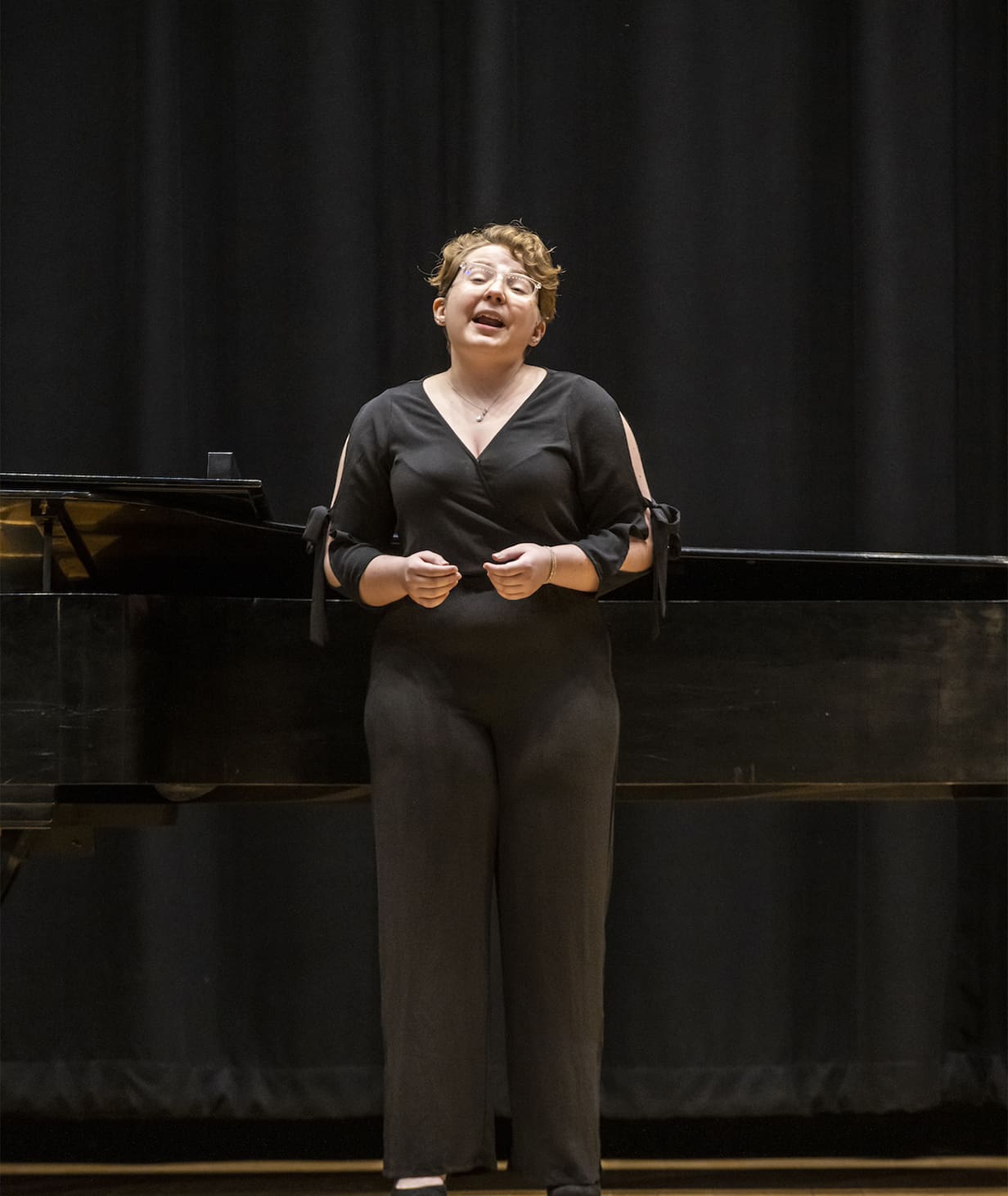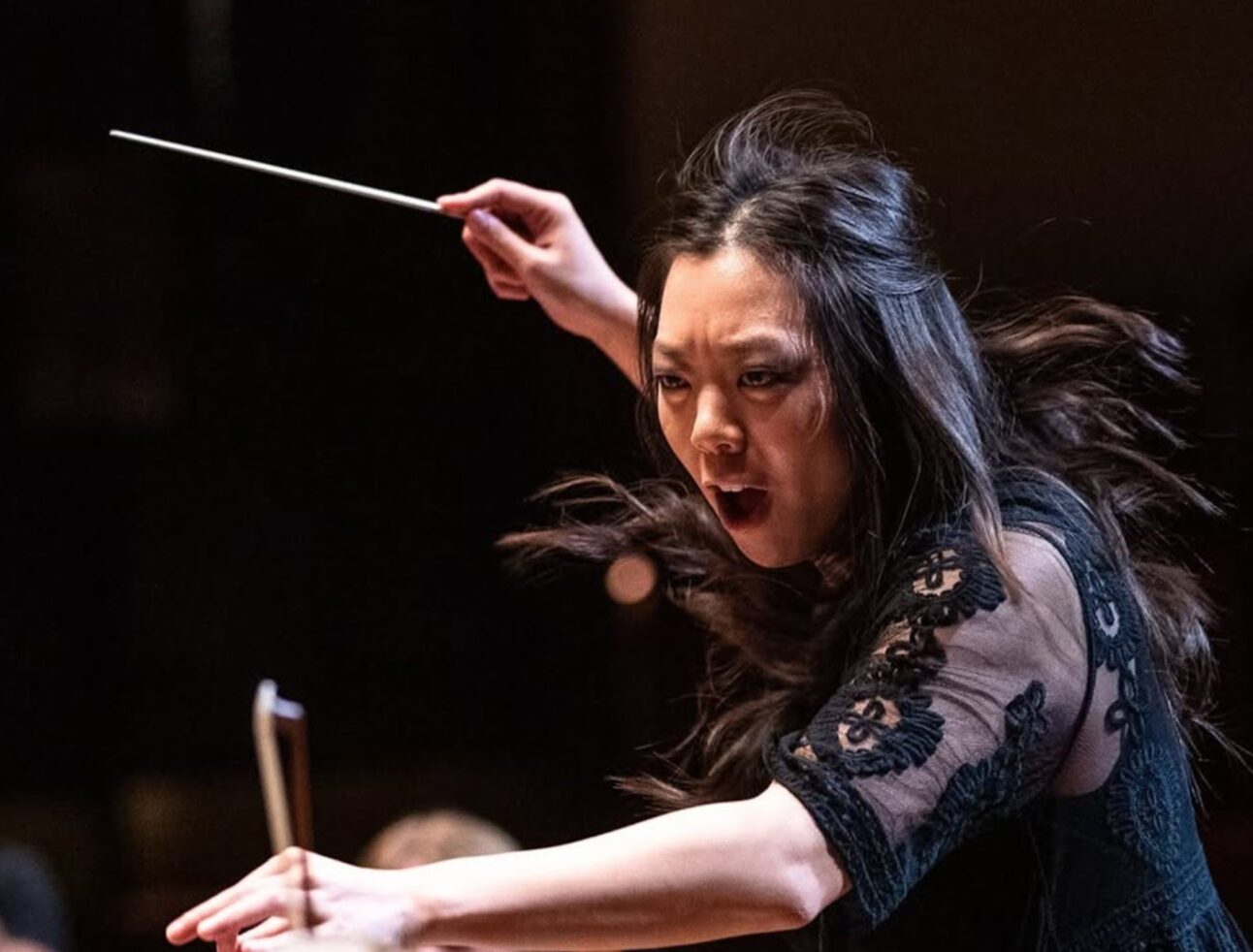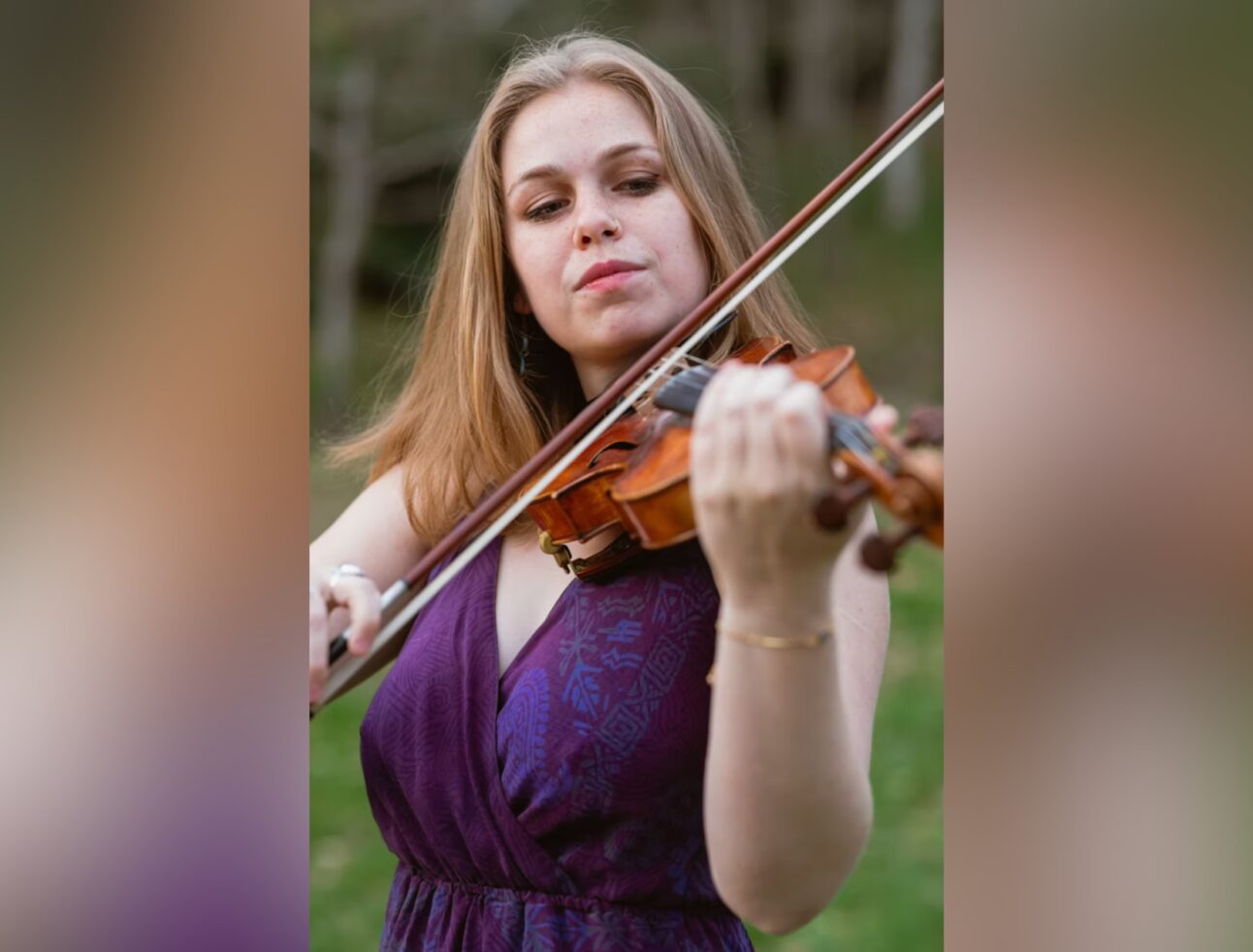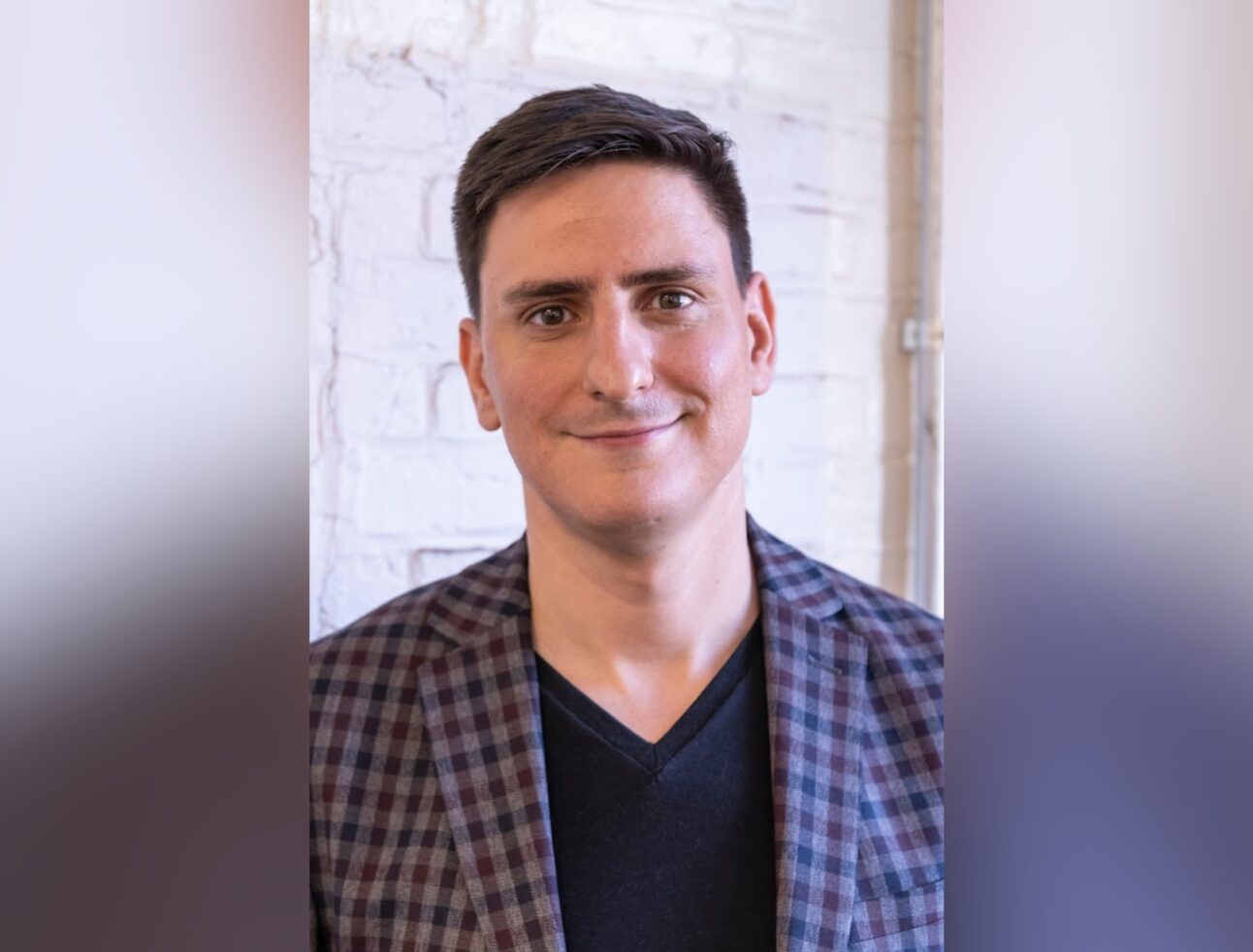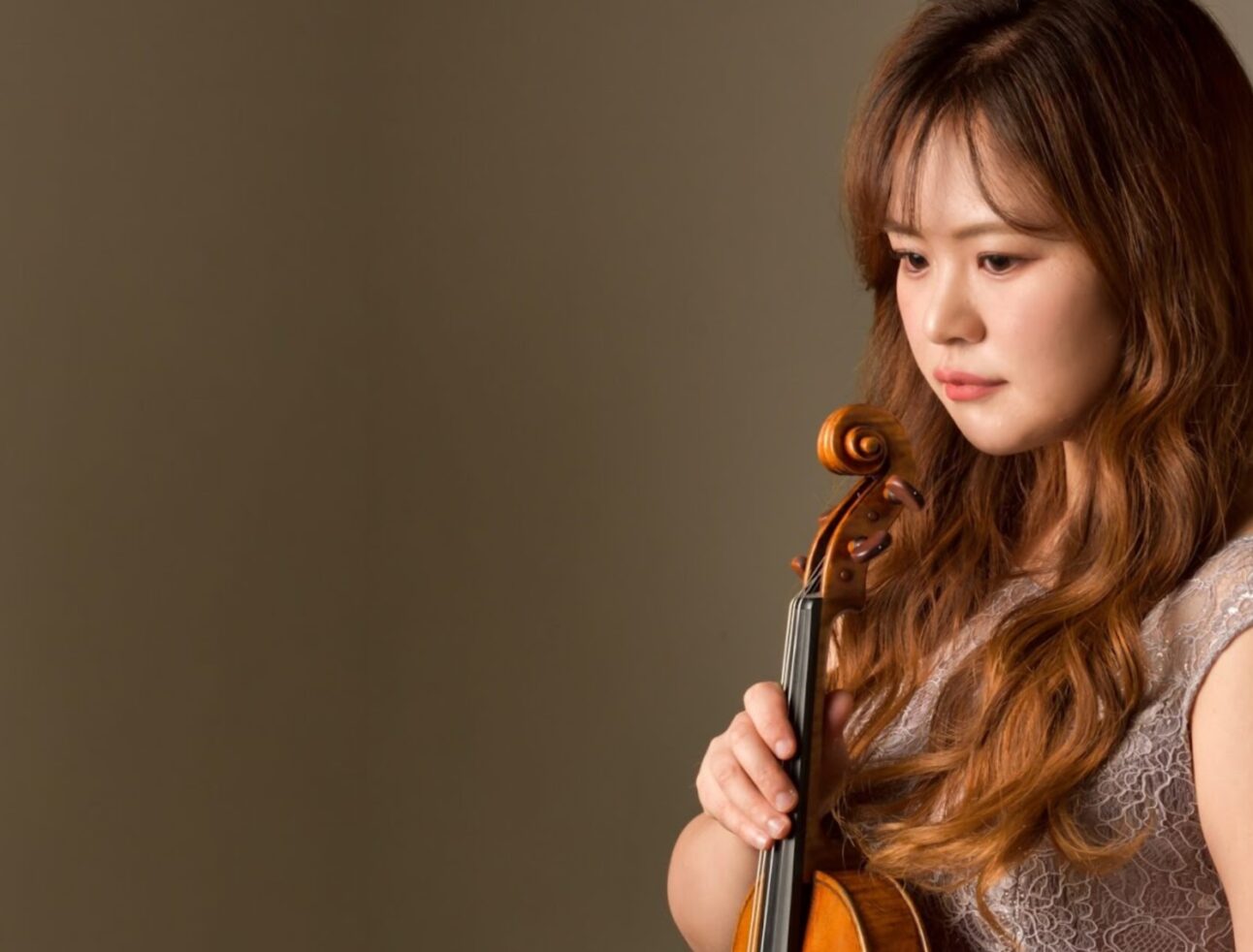When Vocal Performance major Molly Knight ’25 led her first meeting as President of the Queer Student Union (QSU) last fall, she was thrilled by the student turnout: “It was nice to know that people wanted this club to exist. But no matter how many people show up, it’s great just to be there and show people they have a space to go to if they want it.” Throughout this year, she has used her position to create welcoming spaces on campus for LGBTQIA+ students: she developed a Queer Library within NEC’s Center for Cultural Equity and Belonging, coordinated a panel of students, faculty, and staff to share their experiences of being queer in music, and cultivated a welcoming community for LGBTQIA+ students. Knight will continue as co-president alongside student Sylva Goldman next year, with goals including the production of a QSU-led concert.
Knight is a talented classical soprano who fell in love with music very early on. Her musical journey brought her to Interlochen Arts Academy as a high school student and later to NEC for her undergraduate degree, where she studies with faculty member MaryAnn McCormick. With one more year left at NEC, Knight is looking ahead to her post-grad goals, with some help from NEC’s Mentorship Program through her mentor, Vocal Performance alumnus Joseph Smith ’13. She treasures the relationships built at NEC, from favorite faculty members like McCormick and Tanya Blaich to lasting friendships with fellow students forged in spaces like the QSU and on stage performing alongside her peers.
What did your journey into music look like, and what made you decide that you wanted to pursue it in college?
I have loved music ever since I was a kid — I remember bursting out into songs randomly since I was a baby, and music was always my favorite class in school. My parents saw that and took me to orchestra concerts and musicals, and I started playing violin. When I was in fifth grade, I got really into choir. I also liked acting when I was young, and for an audition I did, I needed to have a song prepared. I took some voice lessons for that, and I loved them and never stopped. In my sophomore year in high school, I applied to Interlochen Arts Camp. I went and loved it and didn’t want to leave, so I applied for the academy and later decided I wanted to study voice in college. I never visited NEC in person before coming here because I was applying during the height of COVID-19, but what I saw on NEC’s website and the school’s core mission seemed to align with what I was looking for.
What NEC faculty members have you found to be the most influential?
MaryAnn McCormick is my voice teacher, and she’s been incredibly helpful. She was a big reason I decided to come to NEC, and I’ve learned so much from her in the past few years. Her teaching style is focused on technique, as all teachers do, but she’s not as focused on sound. Instead, she focuses on how everything feels and ensuring that all is technically correct, which has been very helpful. Another thing I appreciate about her is that, while she suggests songs for us to learn, she also lets us bring in whatever we want. She lets us explore and figure out what we want to do on our own, which is great.
Aside from her, there are so many amazing faculty members here. One who comes to mind in particular is Tanya Blaich—she is one of my favorites. I’ve taken both diction and rep classes from her and have learned so much from her in all of them. I’ve grown so much as an artist through her, and she’s been incredibly influential.
This past academic year, you were the President of NEC’s Queer Student Union (QSU). How would you describe that experience?
It’s been good! At the school year’s first meeting, there was a huge turnout, which was amazing. It was nice to know that people wanted this club to exist. But no matter how many people show up, it’s great to just be there and show people they have a space to go to if they want it. I received funding this year to buy queer books for a queer book library that now exists in the CEB Office. A decent number of people have checked out the books and are reading them, which is also nice because as a reader myself, I think reading is a good way for people to feel represented in the media. I’ve gotten to meet a lot more queer people that I didn’t know existed, and we’ve formed a little community. I plan on continuing next year as co-president along with Sylva Goldman.
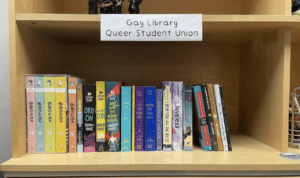
What kinds of goals do you have for the QSU next year?
Northeastern hosts a monthly gathering of queer clubs around Boston, and a couple of us went to that last semester. I’m hoping it will become a continuous thing that we’ll do every single month — to get a group of people to go and meet other queer people around the city.
I’m also hoping that the Queer Student Union can put on a concert similar to the Black Student Union’s annual performance. It wouldn’t be to the same scale just yet since it would be our first one, but it would be a great thing to let everyone figure out what they want to perform, whether it’s a piece by a queer composer or if it’s queer lyrics or whatever it may be.
Can you tell me a little about the “Our Stories” event that the QSU and CEB office collaborated on this spring?
This year was the second year that this event occurred. Students, faculty members, and staff who are queer gathered to listen to a panel discussion on being queer in music and at NEC. We opened the floor for everyone to talk about their experiences, ask questions, and even say things they felt NEC needed to be doing better. I think it was nice because students got to see faculty members who are queer, and it’s great to have that visibility. It was a really positive experience.
You recently became a mentee in NEC’s Mentorship Program. What has that experience been like for you so far?
I haven’t been a part of the program for long, but it has been great. The EM Office paired me with someone who was a voice major at NEC a couple of years ago, named Joseph Smith ’13. I’ve gotten to talk to him about a variety of things within the music industry. He pursued performance for a few years following college but then changed paths. He’s opened up a voice studio to teach students and still performs, but not professionally. It was interesting to hear that side of things and feel reassured that that is an option for me if I decide to go that route. He has also helped me figure out places to apply for the summer. It’s been very beneficial to hear his experiences and get his advice.
Are there any NEC performances you’ve participated in that stick out to you as particularly memorable?
My friend, Anna Poltronieri Tang ’25, produced a performance of Sheila Silver’s song cycle Beauty Intolerable that I was a part of. She got the money to put it on through an EM Grant, which was very cool. Tanya Blaich was the pianist and coach for the performance, so it meant that we all got to work with her, which was amazing because I got to receive a lot of outside coaching from one of my favorite teachers. I actually got paid to be a part of it, which was very nice. It was a great experience.
With one more left at NEC, what are your goals after graduation?
I’m a big planner, so I’ve had this plan for a long time. I am not going to apply for graduate school next year because I want to be able to focus just on school, and I’d like another year for my voice to develop before I apply. I will take a gap year after graduation, and I plan to apply to jobs all over and try to find one in the music industry—something hopefully arts administration-related. It would be nice to stay in Boston so that I could continue taking voice lessons in person with my teacher, but I’ll go wherever I can, and I’ll keep taking lessons no matter what while working and singing gigs.
Reflecting on your NEC experience so far, what would be your best piece of advice for an incoming first-year student?
Connections are important. I would advise a new student to try to talk to as many people as they can, even though it may seem scary. It took me a while to warm up to being at NEC, but everyone here is incredibly friendly and wonderful. It’s nice to meet everyone, and through those interactions, you’ll build strong, lasting connections.
